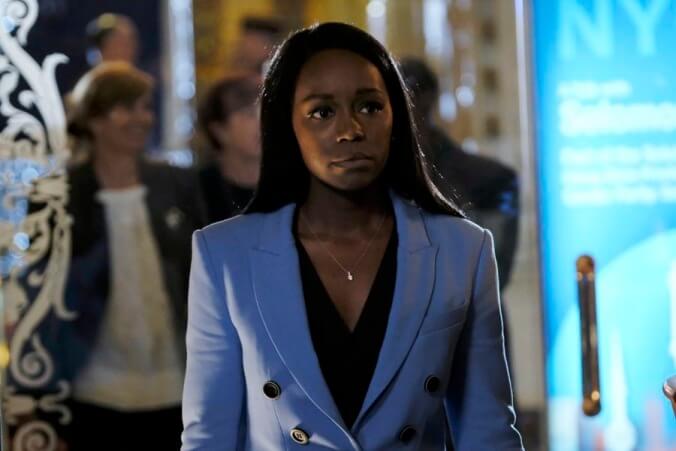Image: How To Get Away With Murder
How To Get Away With Murder loves to resurface family members. It’s a shortcut for the show to stir up stakes, and it’s a go-to trope among soaps in general. Asher’s sister and Michaela’s biological father technically show up in the previous episode, but in “We’re All Gonna Die,” they’re a bigger presence. Asher’s sister stirs things up by telling Asher their mom is suicidal and also that she was the person who actually covered up the Tiffany case, not his father. Michaela’s dad stirs things up by trying to bring her on as a business partner and then, when she demands reparations, handing her a blank check. But the problem with both of these characters is that their drop-in feels like merely an execution of the trope and nothing else. Once the initial surprise of their arrival wears off, we’re left with little else. This has been a consistent problem on the show. New characters show up to turn up the heat, but they do so in such mechanical ways that place plot over character, the forced relationship dynamics not concrete enough to really make an impact.
That’s seen most starkly in everything between Michaela and her father. The lead-up of the search for him is simply not matched by the eventual pay-off. He goes on about her being the biggest regret of his life, and it all just feels so stilted and convenient. It’s not that I necessarily necessarily need this development to be more dramatic. In fact, the strongest parts of the episode are its most grounded ones, which I’ll get into. But it’s difficult to invest too much in Michaela’s daddy drama at the moment. There’s so little life to it. That said, Aja Naomi King continues to have a stellar season.
Every once in a while, How To Get Away With Murder just really kills it with its relationship writing. Even though Cora is also technically a new character, she enters the picture much more organically, and the scenes between her and Tegan are some of the best written ones of the episode. The breakup arc here is grounded and gutting—from the initial attempt to be civil to the sudden blow up to Tegan getting drunk and leaning on Annalise to Cora’s brutal honesty with Tegan. It’s an example of the show not needing to dip into the ultra heightened thriller stuff to craft good, immersive storytelling. Sometimes real life shit is dramatic enough. The dissolution of this marriage is frankly more riveting than a lot of what else happens in the episode.
On a similar note, Connor and Oliver’s storyline here is very well executed, too, another example of compelling relationship writing. The juxtaposition of the way they’re able to open up their relationship sexually and maintain trust with the shattering of that trust once it comes out that Oliver lied about helping Frank find Laurel packs a punch. Connor doesn’t trust Oliver since he lied, but Oliver admits that he didn’t trust Connor wouldn’t have immediately told Annalise. Trust issues have long bred between these two, and they’re not so easily fixed. Their relationship continues to be one of the best written ones on the show and not just when it comes to the romantic ones.
The Frank and Bonnie dynamic has always been pretty solidly written, too, and especially well acted. Even though Frank’s fate is technically the main hook of the episode, we don’t spend very much time with it, but the little quiet moments between Frank and Bonnie touch on their history together, just like the Connor and Oliver conflict does. In their case though, Frank and Bonnie have a much more complicated history, bound together mostly by trauma and also their loyalty to Annalise. That loyalty is called into question by Xavier—another one of the show’s drop-in family members who is more plot device than character—who tells them that Annalise helped disappear Laurel. But Bonnie chooses to believe Annalise, and Frank does, too, because Bonnie is one of the only people he trusts.
Annalise and Bonnie’s one quiet scene together—before Bonnie accuses Annalise of helping Laurel run away—is also a standout moment. I have been weary of bringing so much Sam stuff back into this final season, but Bonnie drives things home when she points out that everything bad started with Sam. She’s not wrong there, and Annalise’s monologue about why she chose Sam in the first place does some long-needed contextualizing of their relationship. It’s convincing, and it peels back even more layers of Annalise while also building on things we’ve already known about her. Outside of some of its grabs at new developments and endless attempts to add gasoline to the fire, “We’re All Gonna Die” has a lot of grounded character work in it, which makes the sprawling narrative a lot more focused. The stakes are so much higher when the characters feel like more than just players in a game.
Stray observations
- I for one am pleased that the torture scenes did not get too graphic, but the POV scenes of Frank in the hospital are a bit hokey.
- I guess Asher is getting a family subplot of his own again.
- “I don’t miss you” is such a terrible thing to say to another person, but I guess Cora is being honest!
- “Let’s say that I screwed up.” “I just did.” Michaela!
- Are we even supposed to care that Laurel is missing anymore?

